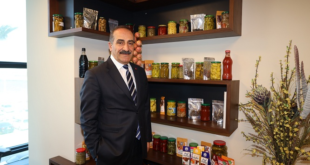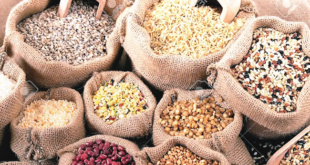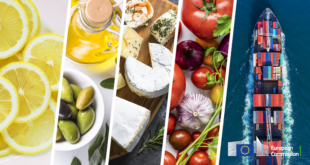The coronavirus outbreak reminded us that all living things are interconnected and whole. Covid 19, which was initially seen as a global health problem, is now more talked about with its economic, social and political dimensions. This is because we experience the effects of fever by experiencing it in all sectors.
Considering that protecting our health is possible with healthy eating, the importance of food safety has increased even more during the Corona days. So how does the Corona Virus outbreak affect agriculture and food globally? Why do we hear the words food shortage and food crisis more often?
In the report of the World Agriculture and Food Organization, while mentioning that 135 million people in 55 countries are already in serious trouble in terms of food security, this has become even more acute due to this virus. The report also states that all countries should take urgent measures and early warning systems in order to reduce their impact on food supply, global food trade and food security.
Due to global developments, the agriculture and food sector started to bear very different roles and responsibilities in addition to its traditional roles. “Bioeconomy”, which is an inclusive concept, has become a topic that concerns the production and consumption, biological waste and recycling, and naturally all sectors in this ecosystem, with a holistic perspective for plants, animals and other living things. In this wide range, all issues such as health, environment, natural resources, energy, logistics, financing, poverty, rural development have revealed the need for a rethinking of agriculture.
Why is agriculture important for our country?
Let’s come to our country, which historically has an agricultural country history and culture. Why do we now have to look at agriculture from a different perspective in our country? Because;
-We have climatic and geographical advantages.
We are in the top ten in the production of 55 products in the world.
-We have a sufficient amount of agricultural land and labor.
– Our biological diversity is high and therefore we can have a competitive power in the world.
Although these topics seem to be our strengths, over the years, due to wrong policies in our country, both our agriculture and food sector have entered a difficult path that will take quite a long time to correct.
As we all know, our country has undergone a serious change in the 1980s with the wave of globalization. With the decisions of January 24, we adopted neoliberal policies within the framework of the market economy and the liberalization of the economy. During this period, the gradual reduction and removal of subsidies and supports for agriculture, with the privatizations carried out during this period, negatively affected the producers due to “domestic production”.
Another issue that exposed the agricultural sector more to the influence of large enterprises was the weakening of cooperatives in agricultural production, and family farming was rapidly abandoned.
However, family farming is one of the cornerstones of agriculture. Family farming is a true production activity, a way of holding on to life and a job door. Local economies have a great role in reducing poverty, protecting agricultural diversity and using natural resources sustainably.
In the 2000s, we can see an improvement movement in our country’s agriculture. However, while the managerial problems of the sector have not been solved yet, these advantages have neither brought a vitality to the sector nor a positive contribution to the farmers who live on agriculture. In this process, among the most important problems of our farmers; productivity gap, unplanned and high-cost production, external dependency, unrecorded production due to the difference between field and shelf prices, and lack of qualified labor; Considering the weakness of marketing skills, the lack of branding, the lack of knowledge of new farming methods of the workers in the sector, and an aging population, the problems are even more intertwined.
On the other hand, although the cooperatives that we think will revive the sector seem very large both in number and in the number of partners, the problems caused by the failure of the cooperatives to fulfill their functions in line with their own purposes are preventing them from being accepted as successful actors in the sector.
Does the Agricultural Sector create a historical opportunity for our country?
I am among those who believe that a great opportunity can be created in the future for our country, which is an agricultural country, given the conjunctural structure of the world. This is undoubtedly a serious source of motivation. However, on condition that the basic principles are put into practice. What are these principles, on what basis do we need to place agriculture on sustainable and circular models?
Sustainability and Circular Agriculture
The concept of sustainability was used for the first time in 1987 in the report titled “My Common Future” published by the World Environment and Development Commission working under the UN. It includes the environment and production potential, as well as foreseeing the most efficient use of existing opportunities and resources. Sustainable agriculture is not just about strengthening our soils. It also emerges as a way to ensure food security, nurture healthy ecosystems, support the sustainable management of soil, water and natural resources, and is therefore a holistic approach.
Circular agriculture is a new and innovative agricultural model. It takes climate change into account and foresees a more holistic and agroecological perspective. In this way, it forces an environmentally friendly, economical and sustainable nature-friendly agriculture.
It focuses on 5 topics:
-Creating high quality soil
-Rain water retention
Improving the water cycle
-Increasing biological diversity
-Improving both human and animal welfare.
In short; By harmonizing “ancient knowledge and technology”, an agriculture based on data, not experience, awaits us.
The Importance of Cooperatives in Circular Agriculture
Basically, cooperatives have an establishment purpose. This is a constant necessity. So, changing this goal at our own will is pointless and quite wrong. Because, as in companies, when cooperatives start to pursue profit by making profit from economic activities or maximizing their capital, the purpose of being together is also broken.
Why do people who do not have enough economic power unite? Why do they promise each other for mutual assistance, solidarity? If that doesn’t happen, what’s the point of being a cooperative?
If we want to talk about the “green revolution” nowadays, it has to be within all cooperatives as well as within “family farms”. In the green revolution, it must be based on “ethics, rules and standards”. Are these standards certain? In any case, standards must be determined first. Just as there are obligations imposed on businesses that do good and organic agriculture, we have to set priority standard rules for “circular economy compatible cooperatives”. How Does? Through pre-harvest, harvest and post-harvest standards.
For example before harvesting; keeping records, worker health, safety and welfare, waste and pollution management, crop-based-crop production / traceability, resistance to diseases and pests, irrigation / water fertilization, soil and substrate management
During the harvest; packaging of the final product, product processing, hygiene rules, packaging and storage areas, quality control
After harvest, we can only ensure the sustainability of our cooperatives with various mandatory rules such as washing and processing.
Why do we have to prepare these standards?
The European Union countries made a commitment package on environmental and social sustainability issues, especially on topics such as reducing greenhouse gas emissions and using renewable energy, in November 2019. The Consensus (European Green Deal), which consists of the standards set by the European Union for its member countries, also has the potential to affect the relations of the European Union countries with third parties. This situation reveals that considering the broad trade and diplomatic ties of the European Union, the Memorandum should be understood by everyone.
RESULT Cooperatives have a “historic opportunity” to adapt to these standards. Either they will force them to comply or they will perish. The decision is on the initiative of the cooperatives and cooperative managers. Is it difficult? YES. But must…
Professor Dr. Meltem Onay,
Vice Rector,
15 November Cyprus University
 THE GLOBAL WINDOW OF TURKISH FOOD AND AGRICULTURE The Global Window of Turkish Food and Agriculture Sector
THE GLOBAL WINDOW OF TURKISH FOOD AND AGRICULTURE The Global Window of Turkish Food and Agriculture Sector









